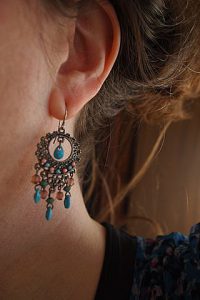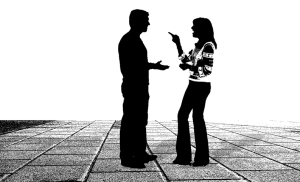Friday
Featured StoriesMindful Communication 2
Part two of an interview with Greg Heffron about an upcoming program at Karmê Chöling
by Mike de Give
 Greg Heffron: In terms of good communication, there are a number of ways to identify within ourselves where to look for that. Like starting with our bodies, our senses, our hearing, our seeing, our feeling. All of these things. You literally cannot listen to somebody if you are not paying attention to your ears. But then there are also our emotional faculties. The heart listens in its own way. It’s like its own sort of ear that listens on a different level, and we’re getting information constantly through our emotions. Are we paying attention to that? Are we mindful of that?
Greg Heffron: In terms of good communication, there are a number of ways to identify within ourselves where to look for that. Like starting with our bodies, our senses, our hearing, our seeing, our feeling. All of these things. You literally cannot listen to somebody if you are not paying attention to your ears. But then there are also our emotional faculties. The heart listens in its own way. It’s like its own sort of ear that listens on a different level, and we’re getting information constantly through our emotions. Are we paying attention to that? Are we mindful of that?
And we pay attention with our mind, as well. We could actually, at a level of thought, be curious about what this person is saying. They’ve just told me something, and I’m thinking about, ‘What does that really mean?,’ or ‘What are the implications of that for them in their life.’ And ‘Why did they choose to tell that to me right now?’ I can be open in that way.
KCL: So, you’re saying that we can be our genuine selves with someone who might be politically diametrically opposed to our views?
Greg: No. I would say actually that there are situations not to engage.
KCL: OK.
Greg: That’s actually a very fundamental part of these teachings as well. We’re not unrealistic. We’re not going to get everybody on the same page all the time. Anybody who promises that is overpromising a bit.
KCL: OK. Sometimes I feel like, rather than having a conversation, I’m saying things I’ve learned from the blogs I read and the other person is saying things from their own set of talking points, and I don’t know if we’re really having a conversation.
 Greg: The key point there is actually, again, coming back to mindfulness. Feel the living situation. Is it open enough that there is actually communication happening? Or has everybody shut down into their view, their camp, their talking points, and actually they’re not listening anymore. And that’s important because if nobody’s listening, why are we talking? Five minutes later, maybe somebody changes and it opens up. So it’s not a fixed situation. It’s never stuck. But we have to be mindful of when it closes, and know what to do in that situation. That’s a big part of our teachings.
Greg: The key point there is actually, again, coming back to mindfulness. Feel the living situation. Is it open enough that there is actually communication happening? Or has everybody shut down into their view, their camp, their talking points, and actually they’re not listening anymore. And that’s important because if nobody’s listening, why are we talking? Five minutes later, maybe somebody changes and it opens up. So it’s not a fixed situation. It’s never stuck. But we have to be mindful of when it closes, and know what to do in that situation. That’s a big part of our teachings.
KCL: One of the things you’ve told me is that when we see communication going off the rails, it may be an option just to stop talking. What else do you talk about in the program?
 Greg: Well it really depends on the parties involved. We talk about three fundamental states that we’ll get into, called the three lights, and we use a traffic light as a metaphor. I won’t go into all that material right now, but it really depends. In the different states you do something quite different. So, if you’re in an open communication state, then things can be quite intense. You can really have debate, and somebody can say, “I think you’re wrong. I don’t really think you’re thinking this through.” And if you’re in an open state, that’s your friend talking to you and they’re really reaching out to you with their open heart, you could consider that maybe they’re right. ‘What if they’re right? What if I am wrong about this?’ That can be quite valuable.
Greg: Well it really depends on the parties involved. We talk about three fundamental states that we’ll get into, called the three lights, and we use a traffic light as a metaphor. I won’t go into all that material right now, but it really depends. In the different states you do something quite different. So, if you’re in an open communication state, then things can be quite intense. You can really have debate, and somebody can say, “I think you’re wrong. I don’t really think you’re thinking this through.” And if you’re in an open state, that’s your friend talking to you and they’re really reaching out to you with their open heart, you could consider that maybe they’re right. ‘What if they’re right? What if I am wrong about this?’ That can be quite valuable.
Then there’s a state of fear that we get into. Fear and shame and self-doubt, where we just feel really thrown and we start to attack ourselves. In that state I don’t feel strong enough, honestly. If this person’s challenging my beliefs, I’m not there yet, in that moment. I’m having kind of an internal crisis. Maybe nobody else can even see it. But I’m having a bit of a crisis, and I’ve got to actually take care of that crisis first. If I don’t take care of that crisis, it tends to spiral into more panic and self-attack. The end result of that panic and self-attack can be a full shut down, where I shut down to myself. I shut down to my own faculties. And when I do that, that’s when it’s very tempting to go into these fixed ideologies. So for ourselves, for somebody else, we have to be able to read what state they’re in to understand what’s true, and what’s useful, what’s kind in that moment.
KCL: I’m seeing more and more as we speak how this ties into meditation. Reading yourself. There’ll be a lot of meditation in this program I’m guessing.
Greg: Yes, absolutely. We’ll be doing sitting meditation that people are more familiar with. We’ll also be doing a number of other meditations, including taking communication itself as a kind of meditation.
KCL: Oh, that’s interesting.
Greg: Instead of coming back to the breath, and paying attention to the breath, what if we’re paying attention to what state this person is in? And what state we’re in? And what’s happening in the conversation. If that becomes the focus of our mindfulness, what is revealed by that? So we’ll do a number of exercises, particularly, over the five-day period, from many different directions, trying to generate that sense. Our communication could be a meditation.
KCL: Is there anything else you want to tell me about this program?
Greg: The last thing I’ll say is, a five-day program is just fantastic because there’s so much more time to do things that we normally can’t begin to touch on. One of the things that we’ve done in our longer retreats in the past is storytelling at night. Kind of a theater-style situation where people can choose to go up to the microphone and just tell a very true personal story to the group, and have the entire group listen. It’s almost like going to the theater. These things happen now.
There are shows like The Moth, where people go and listen to people’s true stories. It’s absolutely compelling. It’s fascinating. It’s funny. People are laughing. People are crying. It’s so powerful, the real-life stories people have been through. And to get to hear them after you’ve been training your listening, and to get to tell your own story to a group that is really tuned in, that is really listening, is quite a transformational experience. So, again, that’s something in our shorter retreats we can’t even do. And there will be many more things like this that we’ll get to do, including, at Karmê Chöling of course, getting outside in the beautiful environment. That alone is a kind of medicine.





